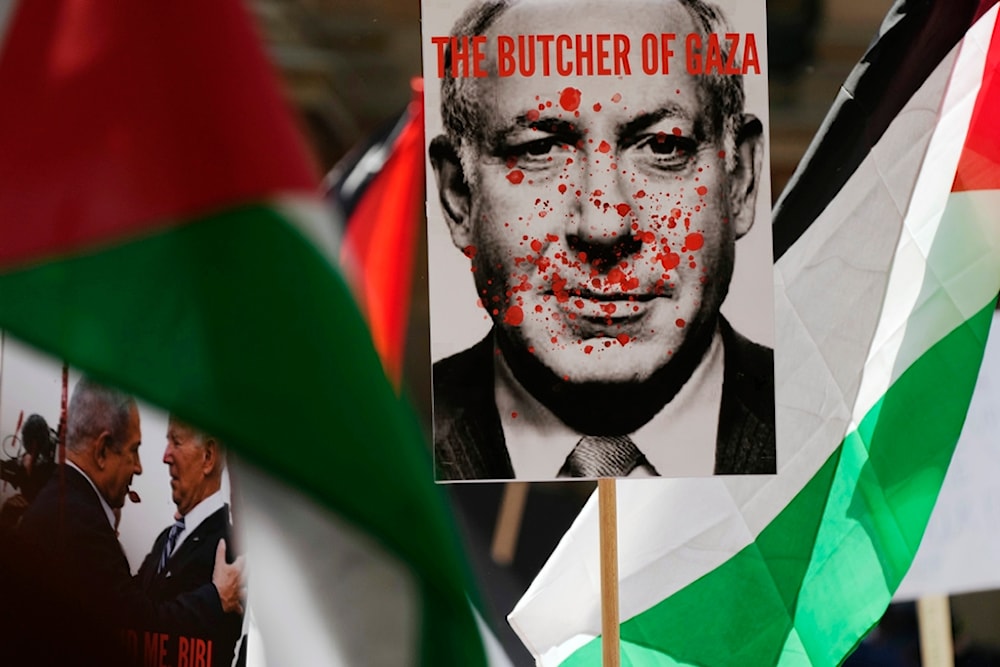'Israel' joins US in UNHRC boycott over 'anti-Semitism'
The Israeli occupation is joining its closest ally, the United States, in its boycott of the UN Human Rights Council over 'anti-Semitism'.
-

Posters showing Israeli Prime Minister Benjamin Netanyahu and then-US President Joe Biden are carried among Palestinian flags during a pro-Palestinian rally in Sydney, Australia, October 21, 2023. (AP)
Israeli Foreign Minister Gideon Sa'ar announced on Wednesday that the Israeli regime would boycott the United Nations Human Rights Council (UNHRC), accusing the body of anti-Semitism and bias against the Israeli occupation.
"This body has focused on attacking a democratic country and propagating anti-Semitism instead of promoting human rights," Sa'ar said in a post on X.
The foreign minister pointed out that the Israeli occupation was the only party with a permanent agenda item dedicated solely to it and has been the subject of more resolutions than Iran, Cuba, the Democratic People's Republic of Korea, and Venezuela combined.
"Israel joins the United States and will not participate in the UNHRC," Sa'ar declared.
UNHRC spokesman Pascal Sim responded to the announcement, clarifying that the Israeli occupation had "observer state status" in the council and is "not one of the 47 member states." He added that "Israel", therefore, cannot formally "withdraw" from the body.
While the Israeli occupation had previously taken part in the periodic reviews required of all UN members, it has boycotted debates on the "human rights situation in Palestine and other occupied Arab territories" for several years.
US also withdraws from UN bodies
The Israeli decision follows US President Donald Trump's executive order on Tuesday, which withdrew Washington from several UN institutions, including the UNHRC.
The order also announced the US would end its support for the UN Relief and Works Agency for Palestine Refugees (UNRWA), with which the Israeli occupation severed ties on Thursday, accusing it of providing cover for Hamas Resistance fighters.
The Israeli occupation's move adds to mounting tensions between the UN and the Israeli government over its policies in the occupied Palestinian territories.
As part of his administration’s policies, Trump announced on Tuesday the signing of a "very tough" directive restoring his maximum pressure campaign on Iran. He also formalized a decision to withdraw US engagement with the United Nations Human Rights Council and continue withholding funding from the UN Palestinian Relief Agency (UNRWA).
Ethnic cleansing of Gaza
Trump on Wednesday stood by his controversial suggestion that the United States assume control of the Gaza Strip, dismissing international criticism and insisting that the plan has been well received.
"Everybody loves it," Trump told reporters in the Oval Office when asked about the overwhelmingly negative reaction from Palestinians, Middle Eastern leaders, and global governments. However, he declined to elaborate further, stating that it was "not the right time" for discussion as he was presiding over the swearing-in of the new US Attorney General, Pam Bondi.
Trump's plan, which envisions displacing Gaza's Palestinian residents to neighboring countries such as Egypt and Jordan, has been widely condemned by international leaders. Critics, including Palestinian officials, human rights groups, and foreign governments, argue that forced displacement violates international law and would escalate tensions in the region.
Middle Eastern governments, including Jordan, Egypt, Saudi Arabia, and Qatar, have firmly rejected the proposal. Jordan's Foreign Minister Ayman Safadi declared that his country would not participate in the forced removal of Palestinians, while Egypt dismissed the plan over concerns about demographic and security implications. Saudi Arabia and the UAE have also distanced themselves from the proposal, reiterating that any resolution should align with existing peace frameworks.
Read more: Europe condemns Trump's Gaza relocation plan as illegal, unacceptable

 4 Min Read
4 Min Read










